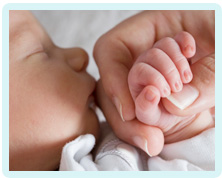
Scared Of Tearing Again!
Any woman who has suffered a third-degree tear in childbirth is naturally apprehensive when they fall pregnant again. Is it possible to have a natural birth after sustaining a third-degree tear? And when advising you of the best delivery method for subsequent births, should your midwife ensure they have an in-depth understanding of the extent of your tear and your recovery?
The chances of tearing in a subsequent birth after previously suffering a third-degree tear
A 2014 study, published in the BJOG, an International Journal of Obstetrics and Gynaecology, suggested that women who experience severe perineal tearing in their first pregnancy are at risk of a recurrent tear in subsequent births.
The study tracked 639,402 first-time mothers who had a vaginal delivery of a single baby between April 2004 and March 2011, and a second birth before April 2012. The research showed that 3.8 percent of women giving birth vaginally for the first time experienced severe tearing. Among those women, 24.2 percent underwent an elective C-section for their second birth, compared to 1.5 percent of women who did not tear at first birth. The fact that nearly a quarter of women who experienced 3rd or 4th degree tears elected to have a Caesarean indicates the apprehension these women felt at the idea of trying to give birth naturally following such a traumatic birth injury.
And the study concluded that their worries were not misplaced. Those women who experienced tearing during their first birth had a 7.2 percent risk of a severe tear during their second vaginal delivery compared to a 1.3 percent risk in women without, representing a five-fold increase in risk.
Factors that can contribute to a third-degree tear
Factors found to contribute to severe tearing in childbirth included:
- the baby being large
- the use of forceps or ventouse
- the baby's head and shoulder getting lodged behind the pubic bone
- the mother being older, of Asian descent and/or having low economic resources
The co-authors of the study, Dr. Leroy Edozien and Dr. Ipek Gurol, said in a press release that, “Clinicians should communicate both the relative and the absolute risk when discussing mode of delivery with women who suffered a severe tear in their previous pregnancy".
"Our results emphasise the need for clear national guidance for healthcare professionals on the optimal mode of delivery for women with a prior severe perineal tear so that they can be counselled appropriately."
Are women being advised properly about the risks of tearing again?
Following the recent death of young mother, Frances Cappuccini - who lost her life delivering her second baby after being refused the C-section she had requested after the traumatic birth of her first child - questions are being asked about whether midwives and childbirth organisations such as the NCT have taken the preference for 'natural birth' too far.
Medical professionals owe a duty to women who have suffered a third-degree tear during a previous labour to explain the risks involved in a further natural birth or Caesarean for subsequent births. A proper examination of the perineal area well before labour begins should be carried out and a decision made as to whether or not a safe natural birth is possible.
If the mother elects to have a C-section because she is afraid of tearing, her wishes should be respected. Third-degree tears are mentally and physically traumatic for a woman and it is the medical profession's responsibility to do everything possible to prevent such an injury occurring again.
At Glynns Solicitors we have the expertise required to act successfully for women who have received a third-degree tear caused by medical negligence.
Please call us on 0800 234 3300 (or from a mobile 01275 334030) or complete our Online Enquiry Form.



